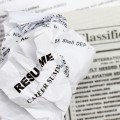 When creating a resume, keep in mind that human resources will make a decision about whether or not to move forward with a job candidate in less than five minutes, according to a new survey by the Society for Human Resource Management (SHRM).
When creating a resume, keep in mind that human resources will make a decision about whether or not to move forward with a job candidate in less than five minutes, according to a new survey by the Society for Human Resource Management (SHRM).
The Resumes, Cover Letters and Interviews Survey was given to over 400 SHRM members across the country.
Inaccuracies in a resume were cited as a major problem area. Seventy-three percent of respondents said that inaccurate resumes sometimes have a negative impact on whether or not a candidate was offered a job interview and 20% said it always has a negative impact.
Some resume best practices include putting everything in chronological order (66%), organizing resumes with bullet points (43%) and tailoring the resume to fit the industry (43%).
The importance of cover letters varied based on industry type and the size of an organization. About 34% of government agencies said that ignoring a cover letter is a mistake, compared to 20% of private sector organizations. Thirty-three percent of companies with fewer than 500 employees said that skipping a cover letter is a mistake, but only 17% of larger organizations agreed.
Most respondents (68%) prefer to get resumes through the company website. Fourteen percent prefer email and 5% prefer using a service like LinkedIn or Career Builder.
When presenting gaps in employment history, majority of respondents (57%) advised candidates to neither hide nor emphasize these gaps.
“Just as there is an expectation of job candidates to be honest when prompted about their work history, it is equally important for HR professionals to be understanding of resume gaps,” said Wanda Barrett, manager of employment at SHRM, in a press release. “The number of layoffs we saw during the recession was historic—for that reason, job gaps should not be an automatic disqualifier.”





